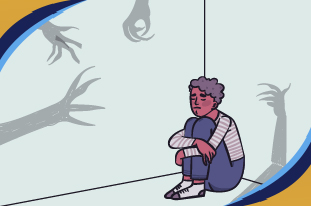The mental condition called obsessive-compulsive disorder, or more as it is more often called “OCD” has been affecting millions worldwide. Many are bewildered by the reason why it is such a prevalent mental disorder, which begs the question of which brain region is believed to play a critical role in OCD. Perhaps, the main location of the OCD brain region can shed some light on how it works, its prevalence, and how it can be treated properly. Obviously, we’ll start with the basics first and then go about explaining the topic of what part of the brain causes OCD and its related questions.
Defining OCD
OCD, or as mentioned before, obsessive-compulsive disorder is a mental condition that is recognizable through symptoms that relate to obsessions and compulsions. Obsessions are essentially intrusive and unwanted thoughts that the affected individuals cannot control on their own and to stop them (which they think they can) they dwell in compulsions, which are ritualistic and repetitive behaviors or mental acts.
These obsessions tend to be:
- The thought of hurting someone you hold dear accidentally
- The thought of hurting someone you hold dear deliberately
- Fear of contamination or getting affected by a contagious disease
- Obsession with symmetry and excessive form craving of organizing things
- Unwanted and intrusive thoughts related to sex, religion, or even something that is considered taboo in the affected individual’s culture.
Compulsions include:
- Excessive cleaning and washing
- Putting things in order and aligning everything in symmetry
- Constant rechecking
- Asking for reassurances from friends and families
- Mental acts such as counting, praying, or reciting something to oneself
OCD can be a critical condition if it is not properly treated in a timely manner. It is a lifelong affliction and the only thing that can help other than treatment is self-education. One can start with finding answers to questions like which brain region is believed to play a critical role in OCD, how OCD affects the brain, or what part of the brain causes OCD.
Read More: Do You Ever Wonder That Your OCD Thoughts Are Not Real?
So, which brain region is believed to play a critical role in OCD?
The orbitofrontal cortex is the part of the brain that is believed to play a significant role in the development and maintenance of OCD. It is a region of the brain located in the front part of the brain, just above the eyes. The orbitofrontal cortex, along with the anterior cingulate cortex is part of the prefrontal cortex that is found in the frontal lobe of the brain. The orbitofrontal cortex is the area of the frontal lobe involved in learning and decision-making. Additionally, it plays an important role in processing sensory information and regulating emotional responses, directly tying it with the symptoms of OCD that most of the time come under the umbrella of emotional responses.

The orbitofrontal cortex is part of the regions or OCD part of the brain that along with the frontal lobe’s cortices is called the OCD circuit, which the research suggests is the dominant part of the brain that is associated with bringing OCD symptoms to life. When it comes to OCD brain activity, the orbitofrontal cortex is the same region that generally becomes hyperactive when OCD raging is at its peak and the time when symptoms are most evident. Other regions of the OCD circuit show heightened activity during peak OCD brain activity which indeed suggests that abnormalities in these regions are closely tied to symptoms of OCD. Research also suggests that areas responsible for stopping habit creation are underdeveloped in the brains of the people who are affected by OCD. Additionally, imbalances in neurotransmitters like serotonin and dopamine, can contribute to the development and maintenance of OCD symptoms.
Do the Abnormalities in the Brain Cause OCD
When it comes to the question of which brain region is believed to play a critical role in OCD, you already have the answer to that. But is there a correlation between the abnormalities found in the region and the causation of OCD? We know that these brain regions can become super active when OCD brain activity is present in something like the orbitofrontal cortex but do they actually cause OCD? The imaging studies do highlight the potential importance of brain dysfunction and the effects of OCD on the brain but there is no direct correlation between differences found in OCD symptoms such as obsessions and compulsions and the abnormalities that are found in the identified regions of the brain that are associated with OCD. This same effect also implies that these abnormalities found in the brain will not lead to the causation of OCD. Therefore, causation and abnormalities of an OCD brain are not directly related.
So What Does Cause OCD
There is no one answer to this question or questions like “how does ocd affect the brain?”,
“effects of OCD on the brain”, or “does ocd damage the brain.” The main causation comes from a range of factors, not just one reason. OCD is known to exist due to genetics, biological factors such as chemical imbalances, learned behaviors over time, environmental factors such as trauma, specific events that trigger OCD or even learned behavior that over time can change the hard wiring of the brain.
Read More: What’s The Difference Between A Mood Disorder And A Personality Disorder?
Treatment For OCD
Now that you know something about which brain region is believed to play a critical role in OCD, it is time to focus a little bit on the treatment of OCD. Treatment for OCD comes in the shape of cognitive behavior therapy CBT, which is a type of psychotherapy and medication or a combination of these two.
CBT such as Exposure Response Prevention is the most suitable for treating OCD, which a goal-based short-term “talk” therapy where a mental health professional helps a patient focus on removing the power of certain triggers that lead to OCD symptoms by exposing the patient to situations that trigger OCD but in a safe space and providing counseling. The most effective for OCD is a type of drug called a Serotonin Reuptake Inhibitor (SRI), which is traditionally used as an antidepressant, but can also be used to treat OCD.
Conclusion
We are now at the end and hopefully understand the question of which brain region is believed to play a critical role in OCD and everything related to it. For treatment of OCD, you can refer to Orange Coast Psychiatry. You also refer to use for other ailments like depression, anxiety, or social anxiety.
























